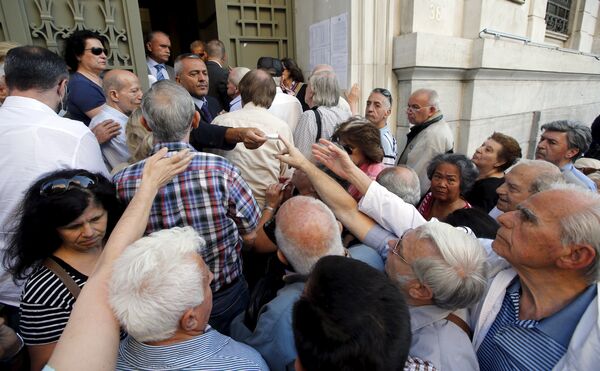On Monday June 29, 2015, the banks did not open, because too many people were pulling money out and moving it abroad, in an effort to retain their wealth. Since then, capital controls have put restrictions on the movement of money.

Yannis Koutsomitis, a world politics and economy analyst, told Sputnik: "Greece — the people and the government — tried to fight austerity — to have a deal with the Eurozone that would not involve the harsh austerity that the Greek people had been enduring in the previous years. But obviously, the Greek government failed. They signed a new bailout agreement and — just a few weeks ago — they agreed to close the first review of the bailout agreement under very hard austerity measures."
"The drug dealing in Athens has been there for quite some time, but right now the feeling of the people is of — let's say — despair and anxiety, because the vast majority really can't cope maintaining their way of living. There is widespread poverty and desperation about the future. The young people are emigrating."
#Greece's biggest supermarket chain Marinopoulos files for bankruptcy protection. https://t.co/VPtq1mc6fg /ht @yanpal7
— Yannis Koutsomitis (@YanniKouts) 28 June 2016
"On the other hand, the middle class wanted an agreement that would keep Greece in the Eurozone and give some light at the end of the tunnel for the country to start growing again. But this is not the case yet. Supposedly, this will come by the middle of 2017, but until then, there is a recession that is closing down shops and medium-sized companies. People are afraid for their jobs every day," Koutsomitis told Sputnik.
Grexit Following Brexit?
There have been calls for Greece to pull out of the Eurozone and go back to the drachma — especially in the light of the result of the UK referendum on membership of the EU, which was for a Brexit. However, Koutsomitis told Sputnik a Grexit was not on the cards.
"The same political parties that were for Greek exit from the Eurozone have been voicing again their resistance against the membership of Greece in the Eurozone — the far left and far right parties. But I don't see a shift in the mainstream parties in their position for Greece remaining in the Eurozone for the foreseeable future."



